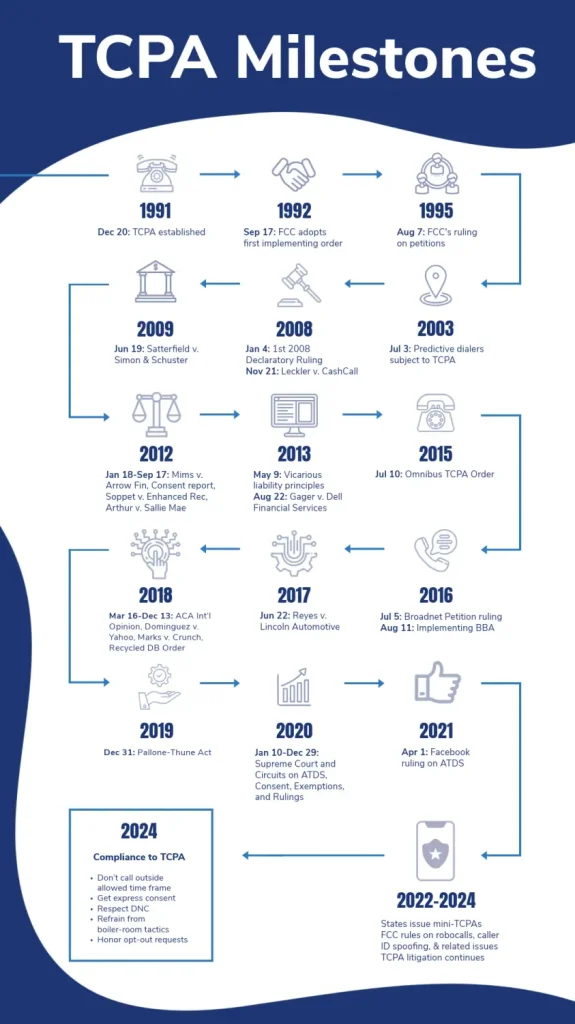Enacted in 1991 to address growing concerns over telemarketing practices, the Telephone Consumer Protection Act (TCPA) is a pivotal federal statute. TCPA regulates the use of automated dialing systems, prerecorded voice messages, SMS text messages, and fax machines. Over the years, significant court decisions have shaped the interpretation and enforcement of TCPA.
Key Provisions of TCPA
TCPA primarily regulates:
- Autodialed calls—Restrictions on calls made using an automatic telephone dialing system (ATDS) to cell phones and certain landlines without prior express consent
- Prerecorded messages—Prohibition of prerecorded voice messages to residential lines without prior express consent
- Do-Not-Call (DNC) registry—Establishment of a national DNC registry, allowing consumers to opt-out of receiving telemarketing calls
- Text messages—Extension of the same restrictions applicable to voice calls to SMS text messages
Significant Regulatory Decisions and Interpretations
1990s
An increasing volume of unsolicited calls signaling the rise of telemarketing prompted the U.S. Congress to address consumer privacy and reduce nuisance calls. TCPA was born on December 20, 1991 when the Congress amended Title II of the Communications Act of 1934, adding Section 227 (47 U.S.C. Section 227).
Consumers welcomed the legislation as a necessary step to protect their privacy. Telemarketers, however, saw it as a significant regulatory burden that would limit their outreach efforts.
On September 17, 1992 the Federal Communications Commission (FCC), an independent U.S. government agency that regulates interstate and international communications, adopted the 1992 Implementing Order. This order clarified that autodialers don’t include artificial or prerecorded voice transmissions and also addressed consent related to phone numbers.
The FCC’s goal was to provide clear guidelines on what constitutes an autodialer and to clarify consent requirements. Telemarketers adjusted their strategies to comply with the new definitions, and consumers appreciated clarification of their rights.
2000s
Telemarketers’ increasing use of predictive dialers led to pressure to apply regulatory oversight in order to prevent abuse and protect consumers. On July 3, 2003 FCC’s 2003 Report and Order subjected predictive dialers to TCPA, emphasizing their capacity to dial numbers without human intervention.
As a result, telemarketers faced increased compliance costs and operational adjustments. Consumers saw it as a victory for privacy and reduced unwanted calls.
To address ambiguities regarding consent in debt collection calls and ensure fair practices, on January 4, 2008 the FCC adopted the first 2008 Declaratory Ruling. This ruling confirmed that numbers given in debt transactions could be called using automated technologies and affirmed predictive dialers’ inclusion under TCPA.
Consequently, debt collectors had to ensure that they obtained proper consent while consumers gained clarity on when it was permissible for them to be contacted.
To delineate the scope of judicial review over FCC decisions and reinforce regulatory authority, on November 21, 2008 Leckler v. CashCall mentioned the Hobbs Act in TCPA jurisprudence for the first time. This impacted court jurisdiction over FCC rulings.
Legal practitioners closely monitored implications for future TCPA litigation, with consumers and telemarketers awaiting further clarity.
2010s
To provide a consistent legal venue for TCPA claims and streamline the litigation process, on January 18, 2012 the U.S. Supreme Court announced its decision in Mims v. Arrow Financial Services, LLC. It held that federal and state courts have concurrent jurisdiction over private actions brought under the TCPA. This ruling confirmed that individuals can file TCPA lawsuits in both federal and state courts, broadening the avenues for redress available to consumers.
This decision led to a surge in TCPA lawsuits as consumers found it easier to pursue claims. Telemarketers faced a heightened risk of litigation and increased legal scrutiny.
On February 15, 2012 FCC’s 2012 Report and Order mandated express written consent for telemarketing calls to cell phones and removed the established business relationship exemption. The goal was to tighten consent requirements and eliminate loopholes that allowed unsolicited calls.
Consumers welcomed stronger consent rules while telemarketers had to overhaul their consent practices and documentation.
To protect current subscribers from calls intended for previous owners of the phone numbers, on May 11, 2012 the Seventh Circuit’s Soppet v. Enhanced Recovery defined the “called party” for consent purposes as the current subscriber, imposing strict liability on callers.
Telemarketers faced increased risks of inadvertently violating TCPA while consumers benefited from greater protections against misdirected calls.
To address evolving telemarketing technologies and clarify regulatory definitions, on July 10, 2015 FCC’s Omnibus TCPA Order affirmed predictive dialers as ATDS and introduced stringent revocation and consent rules, which were later partly overturned by the D.C. Circuit.
Consumers appreciated the broader protections, but telemarketers argued that the definitions were too expansive and burdensome.
The proliferation of robocalls and consumer complaints prompted legislative action to curb abusive practices. On December 31, 2019 Congress passed the Pallone-Thune Telephone Robocall Abuse Criminal Enforcement and Deterrence Act, addressing robocalls.
Consumers hailed the act as a major step towards reducing robocalls. However, telemarketers, especially those relying heavily on automated calls, faced new regulatory challenges.
In 2016 the Supreme Court ruled in Campbell-Ewald Co. v. Gomez that an unaccepted settlement offer or offer of judgment doesn’t moot a plaintiff’s TCPA claim. This decision affirmed that defendants can’t avoid TCPA class action lawsuits by offering to settle with individual plaintiffs.
In another legal decision in 2016, although not in a TCPA-specific case, Spokeo, Inc. v. Robins influenced TCPA litigation by addressing the issue of standing. The Supreme Court held that plaintiffs must demonstrate concrete harm even in cases involving statutory violations so as to satisfy the injury-in-fact requirement of Article III standing.
In 2018 in ACA International v. FCC, the D.C. Circuit Court of Appeals struck down parts of a 2015 FCC order that broadly defined autodialers and imposed strict liability for calling reassigned numbers. The court invalidated the FCC’s expansive interpretation of what constitutes an ATDS and the strict liability approach for calls made to reassigned numbers without the caller’s knowledge.
2020s
In 2020 in Barr v. American Association of Political Consultants, the Supreme Court ruled that the government-debt exception to the TCPA’s robocall ban violated the First Amendment. However, instead of invalidating the entire robocall ban, the Court severed the exception from the statute, leaving the rest of the TCPA intact.
To provide clarity and limit the scope of what constitutes an ATDS under the TCPA, on April 1, 2021 the Supreme Court’s Facebook ruling narrowed the TCPA’s ATDS definition to devices with the capacity to store or produce numbers to be dialed using an ATDS. This ruling significantly limited the scope of devices considered autodialers under TCPA.
Telemarketers found relief in the narrower definition, potentially reducing their compliance burden. On the other hand, consumers and consumer advocacy groups expressed concerns over potential loopholes that could allow more unsolicited calls.
In December 2023, the FCC made significant amendments to TCPA regulations including requirements for businesses to obtain a consumer’s prior express written consent before making calls or sending texts using an ATDS, prerecorded message, or artificial voice. The FCC also extended DNC provisions to cover text messages, requiring prior express invitation or permission before sending marketing texts to numbers listed on the DNC registry.
In 2024, in United States v. Stratics Networks, Inc., a case with broad implications, the U.S. District Court for the Southern District of California dismissed claims against Stratics Networks, a provider of ringless voicemail and VoIP services. The court ruled that Stratics was protected under Section 230 of the Communications Decency Act, which grants immunity to providers of interactive computer services from civil liability based on third-party content. This ruling underscored TCPA’s limitations in holding platform providers liable for users’ misuse of technology.
Sources:
- Carlton Fields: Telephone Consumer Protection Act
- Crowell: Supreme Court Limits the TCPA’s Definition of Autodialer
- Dentons: In the Wake of Facebook v. Duguid, Courts Continue to Split Over Definition of Automated Telephone Dialing System
- DNC-com: Compliance After Facebook v. Duguid
- FCC: February 2024 Declaratory Ruling
- FDIC: VIII. Privacy—Telephone Consumer Protection Act
- FCC: FCC Actions on Robocalls, Telemarketing
- FCC: Robocall Facilitators Must Cease and Desist
- FCC: Stop Unwanted Robocalls and Texts
- Goodwin: 2023 Year in Review: Telephone Consumer Protection Act
- K&L Gates: It’s No Joke: In 1 April 2021 Decision, Supreme Court Significantly Limits Defiition of “ATDS” under the TCPA
- Locke Lord: Locke Lord Obtains Groundbreaking Ruling on Behalf of Stratics Networks in Case With Major Telemarketing Sales Rule and TCPA Implications
- Skadden: The Evolving Telephone Consumer Protection Act Landscape Post-Duguid
- TCPAWorld: The Developments that Rocked TCPAWorld

TCPA Milestones (credit: Innovation Direct Group)
State-Level Mini-TCPA Laws
Several states have enacted their own telemarketing laws, often referred to as “mini-TCPA” statutes. These laws typically impose stricter requirements and penalties than the federal TCPA.
California
California has enacted its own privacy and telemarketing laws that include provisions similar to TCPA. The California Invasion of Privacy Act (CIPA) is often used in conjunction with TCPA claims. CIPA addresses wiretapping and eavesdropping, extending protections to various forms of electronic communications.
Florida
The 2023 amendment to the Florida Telephone Solicitation Act clarified ambiguities and aligned its definition of an ATDS more closely with the federal TCPA. It also introduced new restrictions on text message solicitations.
Georgia
Proposed amendments to Georgia’s telemarketing laws aim to tighten restrictions on autodialed calls and enhance penalties. The bill includes provisions for civil litigants to recover at least $1,000 per violation and facilitates class actions.
Maryland
The “Stop the Spam Calls Act of 2023” prohibited certain caller ID-blocking technologies and set stricter rules for solicitation calls, including a cap on the number of calls per day.
New York
Amendments to New York’s telemarketing laws increased penalties for violations and required telemarketers to offer consumers the option to be added to the company’s internal DNC list at the start of a call.
Oklahoma
The Oklahoma Telephone Solicitation Act (OTSA) of 2022 includes provisions similar to the TCPA but with broader definitions. The OTSA permits civil litigants to recover at least $500 per violation and imposes additional restrictions on autodialed calls.
Texas
The Texas Business and Commerce Code requires telemarketers to hold a registration certificate with the Texas Secretary of State and imposes penalties of up to $5,000 per unregistered call.
Virginia
The Virginia Telephone Privacy Protection Act mandates that telemarketers identify themselves and the entity on whose behalf the call is made at the beginning of the call. Violations can result in statutory damages of up to $5,000 for subsequent offenses.
Washington
Washington updated its telemarketing laws to broaden the definition of “telephone solicitation” and impose new requirements on telemarketers, including ending calls within 10 seconds if the called party indicates they want to end the call.
Sources:
- JD Supra: Mini-TCPA Laws You Should Know and That May Be Coming Soon in 2023
- OneTrust DataGuidance: USA: State ‘mini-TCPAs’ on the rise
- PossibleNOW: State-based TCPA Telemarketing Rules
Further Thoughts
TCPA litigation continues to evolve, with new technologies and marketing practices challenging existing regulations. Session replay technology, used to validate TCPA consent, has faced legal challenges related to privacy concerns.
Courts have varied in their interpretations, leading to inconsistent rulings across different jurisdictions. This area of law is expected to continue evolving as courts and regulators address the complexities of applying old statutes to new technologies.
As states continue to enact and update mini-TCPA laws, the regulatory landscape for telemarketing practices will become increasingly complex, necessitating careful navigation by businesses so as to avoid costly litigation. TCPA’s evolution reflects a balancing act between consumer privacy and telemarketers’ operational needs.
For more insights and innovative solutions in digital marketing, visit Innovation Direct Group.
#tcpa #telemarketing #innovationdirectgroup


